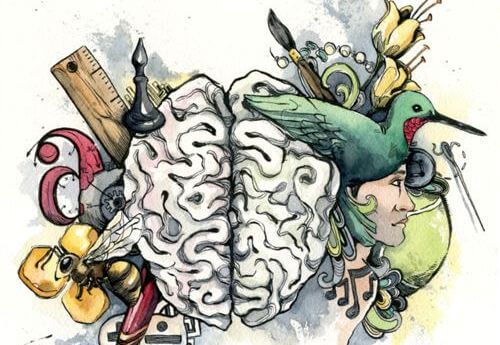There Are Words That Only Reach the Ear and Others That Kiss the Soul

Words are not only the result of a vibrating larynx, processing neurons, and an organizing brain. We are the sum of our hidden cries, our desires traced at sunrise, and all the caresses offered in secret. Our words are worlds with a great emotional power to unite us with one another.
We were created to respond to affection. Our brain is the fascinating result of evolution. Words create connections, they console, teach, comfort, and of course, sometimes, they go beyond the ear and “caress our soul.”
Words are transparent spaces and the only mirrors that can reflect our thoughts, our kindness, and that wise love that knows how to choose the most powerful terms to make us tremble.
If our language is the music that emerges through that wonderful violin where our emotions are hidden, there is one thing that is clear: we do not all know how to use it properly. Sometimes, the melody is harmful and we bring unhappiness. Other times, we are unable to make ourselves understood, to transmit and move.

Words: Intermediaries between affections and language allowing us to grow
The kind of language we establish in our romantic relationships, our family relationships, and even when raising our children is definitely important. So much so that according to a study performed at the National Autonomous University of Mexico, a baby who experiences affectionate and emotionally positive language will have more optimal cognitive development.
But it is not always easy to find a person who has the ability to offer us the right words at the moment we need them. That wisdom, the wisdom of one who has mastered the perfection of emotional language as well as intuition and empathy, is far from abundant. As a result, there has been a considerable increase in the number of voices within our educational system demanding the integration of emotional education.

Emotional literacy: When language is at the service of affection
There are a few characteristics of language at the service of affection.
- Emotional literacy means developing an understanding the perspectives of others to “tune into” their emotional state.
- Something like this could only be obtained by starting with a child and having them recognize their own emotions, while also offering them strategies to express what they are feeling through language.
- The ability to offer a proper emotional response would help children, for example, to reduce their reactivity to negative emotions, like anger.
- Furthermore, they would better understand their own feelings by also being able to put them in words. All of this would provide them with a marvelous command of emotional language as a tool of self-discovery and a bond to connect them to others.
As we all know, everything referring to Emotional Intelligence is “teachable.” It is not only children who are receptive to this kind of learning; we, too, must be aware that language has the ability to bring us together or push us apart. It is vital that words always be a tool for growth and not destruction.
Words that heal, emotions that strengthen our brain
Emotional connections are the golden thread that weaves the cloth of our social life. Understanding and the use of Emotional Intelligence, as we have seen, helps us better understand ourselves and greatly enriches our interpersonal relationships.
From an evolutionary standpoint, this has not always been the case. Our brain is actually made up of three superimposed and interconnected structures that are the product of our centuries-long evolution.
The deepest part is the reptilian brain (brain stem and cerebellum), which controls our instincts and autonomic functions. Next comes the limbic system, where our emotions reside, and which also has an intimate connection to the neocortex, the area responsible for the most advanced thought and of course language.

As we can see, that marvelous evolutionary product, the brain, meets at a vital pillar: the relationship between language and emotions. This is a detail we often do not focus on, but as we pointed out at the start of this article, “we were created to respond to affection.”
A child would not develop in a healthy way or even survive if he did not have his parents’ affection. Words ignite the neurochemistry in our brains to make us feel certain emotions, while emotions turn into actions, changes, powerful strength of will…
Words allow us to assuage fears, relieve anguish, dispel loneliness, and cheer up numb hearts. Sometimes we forget this, of course. We neglect the great resource that our mouths and hearts provide for creating bonds and bringing happiness to our loved ones. It is worth keeping this in mind…
Our tongue has no bones and yet it is strong enough to break a person’s heart. Be cautious with your words, be wise, be prudent, be respectful…

Words are not only the result of a vibrating larynx, processing neurons, and an organizing brain. We are the sum of our hidden cries, our desires traced at sunrise, and all the caresses offered in secret. Our words are worlds with a great emotional power to unite us with one another.
We were created to respond to affection. Our brain is the fascinating result of evolution. Words create connections, they console, teach, comfort, and of course, sometimes, they go beyond the ear and “caress our soul.”
Words are transparent spaces and the only mirrors that can reflect our thoughts, our kindness, and that wise love that knows how to choose the most powerful terms to make us tremble.
If our language is the music that emerges through that wonderful violin where our emotions are hidden, there is one thing that is clear: we do not all know how to use it properly. Sometimes, the melody is harmful and we bring unhappiness. Other times, we are unable to make ourselves understood, to transmit and move.

Words: Intermediaries between affections and language allowing us to grow
The kind of language we establish in our romantic relationships, our family relationships, and even when raising our children is definitely important. So much so that according to a study performed at the National Autonomous University of Mexico, a baby who experiences affectionate and emotionally positive language will have more optimal cognitive development.
But it is not always easy to find a person who has the ability to offer us the right words at the moment we need them. That wisdom, the wisdom of one who has mastered the perfection of emotional language as well as intuition and empathy, is far from abundant. As a result, there has been a considerable increase in the number of voices within our educational system demanding the integration of emotional education.

Emotional literacy: When language is at the service of affection
There are a few characteristics of language at the service of affection.
- Emotional literacy means developing an understanding the perspectives of others to “tune into” their emotional state.
- Something like this could only be obtained by starting with a child and having them recognize their own emotions, while also offering them strategies to express what they are feeling through language.
- The ability to offer a proper emotional response would help children, for example, to reduce their reactivity to negative emotions, like anger.
- Furthermore, they would better understand their own feelings by also being able to put them in words. All of this would provide them with a marvelous command of emotional language as a tool of self-discovery and a bond to connect them to others.
As we all know, everything referring to Emotional Intelligence is “teachable.” It is not only children who are receptive to this kind of learning; we, too, must be aware that language has the ability to bring us together or push us apart. It is vital that words always be a tool for growth and not destruction.
Words that heal, emotions that strengthen our brain
Emotional connections are the golden thread that weaves the cloth of our social life. Understanding and the use of Emotional Intelligence, as we have seen, helps us better understand ourselves and greatly enriches our interpersonal relationships.
From an evolutionary standpoint, this has not always been the case. Our brain is actually made up of three superimposed and interconnected structures that are the product of our centuries-long evolution.
The deepest part is the reptilian brain (brain stem and cerebellum), which controls our instincts and autonomic functions. Next comes the limbic system, where our emotions reside, and which also has an intimate connection to the neocortex, the area responsible for the most advanced thought and of course language.

As we can see, that marvelous evolutionary product, the brain, meets at a vital pillar: the relationship between language and emotions. This is a detail we often do not focus on, but as we pointed out at the start of this article, “we were created to respond to affection.”
A child would not develop in a healthy way or even survive if he did not have his parents’ affection. Words ignite the neurochemistry in our brains to make us feel certain emotions, while emotions turn into actions, changes, powerful strength of will…
Words allow us to assuage fears, relieve anguish, dispel loneliness, and cheer up numb hearts. Sometimes we forget this, of course. We neglect the great resource that our mouths and hearts provide for creating bonds and bringing happiness to our loved ones. It is worth keeping this in mind…
Our tongue has no bones and yet it is strong enough to break a person’s heart. Be cautious with your words, be wise, be prudent, be respectful…

This text is provided for informational purposes only and does not replace consultation with a professional. If in doubt, consult your specialist.







